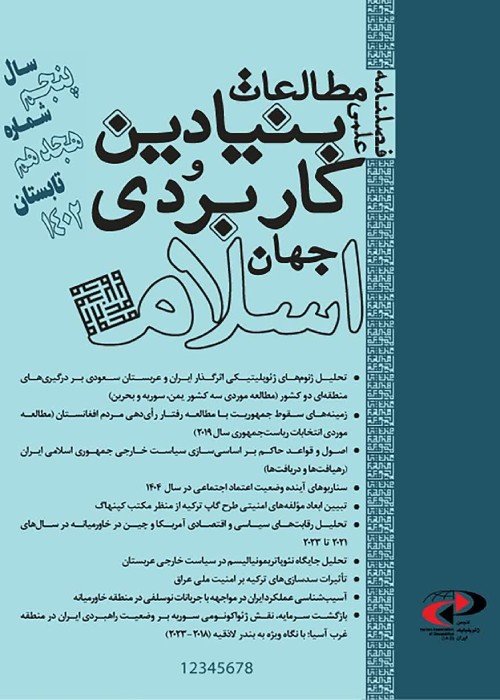Ethnic-Religious violence in the Arab Middle East in context of the Nation-state crisis
Author(s):
Article Type:
Research/Original Article (دارای رتبه معتبر)
Abstract:
Extended Abstract: Since World War II, more than half of the world's nations have experienced ethnic strife, and domestic violence in the form of an ethnic and religious foundation has been a very important and bitter reality in the world. In the present age, ethnic-religious conflicts have been a major concern and challenge for decision makers and scientists. Ethnic and religious violence in the post-Cold War era has become the most important bitter reality in many societies. In the post-Cold War era, the vast majority of violent international conflicts have been the result of internal strife, making it difficult to distinguish between domestic and international conflicts. Carment's study of violence between 1945 and 1981 found that of the 460 recorded cases, 202 were non-ethnic and 258 were ethnic, with 103 reported high and bloody violence. In the present age, the prevalence and spread of identity conflicts have caused geopolitical issues to take on a significant degree of geoculturalism, and international politics has largely taken on an identity nature. By allocating a quarter of the world's violence and ethnic and religious strife to the Middle East, these Region has become a focal point for politics and identity conflicts. This research is an explanatory research and has been done by causal-analytical method and historical-political sociological theoretical approach. The research question is what are the most important sociological and internal factors influencing the escalation of terrorism and ethnic-religious violence in the Arab Middle East since the late 1990s? The research hypothesis is as follows: Focusing on the historical-political sociological approach, we can say that the crisis of government and nation-building and the crisis of identity and the resulting political legitimacy play an essential, profound and important role in creating and paving the way for terrorism. There has been ethnic-religious violence. Of course, the author believes that, like any other social phenomenon, violence should be viewed for several reasons, but the need for in-depth exploration requires that the subject be explained and explained by focusing on one or two factors. The most important finding of this study is that in the Arab Middle East, ethnic and religious violence, which has now erupted more than ever before, has a historical past in the last century. Historically, two systemic crises, the crisis of political legitimacy and the crisis of identity, have been the main cause of ethnic-religious violence and the lack of democratic behavior and instability in the region. The crisis of the state and nation-building, and the crisis of identity and the resulting political legitimacy, have played an essential, profound and important role in creating and paving the way for terrorism and ethnic-religious violence. In the context of the problem and the general assumption of the research, the results of this study show that in most of the Arab Middle East, especially in the authoritarian republics, a mixture of extroverted model of state-building with direct involvement of colonial powers and imposed nation-building led these countries to From the very beginning, they face systemic crises, namely the crisis of legitimacy and the crisis of identity. The crisis of legitimacy over the government-nation divide and the rejection of the entire illegitimate political system by most ethnic and religious groups, in addition to the illegitimacy of the beginning and establishment, is rooted in ethnic-religious, political, cultural and economic discrimination. And mismanagement of discriminatory and unfair distribution policies. On the other hand, nation-building has led to a pervasive crisis of national identity in multi-ethnic and religious communities in the Arab Middle East, resulting in severe fragmentation of these communities and the formation and institutionalization of the seeds of national divergence and non-convergence. The findings of this study show that the existence of these two systemic and deep-rooted crises provided a historical and rooted obstacle for centrifugal movements and ethnic-religious violence in the region. At some point in history, such a backlash led to the emergence and outbreak of some violent mass actions and movements. But in relatively long historical periods, due to the structure of the rigid and repressive political power and the high political, human and financial costs, these movements remained silent but remained as a fire under the ashes and acted. Such a deep-rooted and institutionalized historical backbone in a number of countries in the region, such as Myanmar, Bahrain, Libya, Lebanon, Syria, and Iraq, has led to the emergence and perpetuation of a widespread wave of ethnic, religious, and takfiri violence. This pervasive wave has far-reaching consequences that even European countries have not been spared.
Language:
Persian
Published:
Journal of Fundamental and Applied Studies of the Islamic World, Volume:2 Issue: 3, 2020
Pages:
94 to 114
magiran.com/p2140405
دانلود و مطالعه متن این مقاله با یکی از روشهای زیر امکان پذیر است:
اشتراک شخصی
با عضویت و پرداخت آنلاین حق اشتراک یکساله به مبلغ 1,390,000ريال میتوانید 70 عنوان مطلب دانلود کنید!
اشتراک سازمانی
به کتابخانه دانشگاه یا محل کار خود پیشنهاد کنید تا اشتراک سازمانی این پایگاه را برای دسترسی نامحدود همه کاربران به متن مطالب تهیه نمایند!
توجه!
- حق عضویت دریافتی صرف حمایت از نشریات عضو و نگهداری، تکمیل و توسعه مگیران میشود.
- پرداخت حق اشتراک و دانلود مقالات اجازه بازنشر آن در سایر رسانههای چاپی و دیجیتال را به کاربر نمیدهد.
دسترسی سراسری کاربران دانشگاه پیام نور!
اعضای هیئت علمی و دانشجویان دانشگاه پیام نور در سراسر کشور، در صورت ثبت نام با ایمیل دانشگاهی، تا پایان فروردین ماه 1403 به مقالات سایت دسترسی خواهند داشت!
In order to view content subscription is required
Personal subscription
Subscribe magiran.com for 70 € euros via PayPal and download 70 articles during a year.
Organization subscription
Please contact us to subscribe your university or library for unlimited access!



